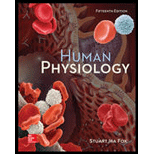
Human Physiology
15th Edition
ISBN: 9781259864629
Author: Fox, Stuart Ira
Publisher: Mcgraw-hill Education,
expand_more
expand_more
format_list_bulleted
Concept explainers
Question
Chapter 4, Problem 5cCP
Summary Introduction
To review:
The effect of a defective enzyme on the concentration of the intermediates in a pathway.Â
Introduction:
The mechanism of end-product inhibition is used for controlling the amount of product formed in a reaction. During this inhibition, the final product inhibits the activity of an enzyme involved in initiation of the formation of this end-product. End-product inhibition occurs in order to prevent the accumulation of the final product.
Expert Solution & Answer
Want to see the full answer?
Check out a sample textbook solution
Students have asked these similar questions
Because of an inborn error of metabolism, suppose that the enzyme that catalyzed the third reaction in your pathway (see no. 5a) was defective. Describe the effects this wouldhave on the concentrations of the intermediates in your pathway.
Why does metabolism not grind to a halt when an endergonic reaction occurs within a pathway?
Give the two reasons why anabolic reactions in metabolism are not exactly the reverse of catabolic pathway.
Chapter 4 Solutions
Human Physiology
Ch. 4 - Use the lock-and-key model to explain how enzymes...Ch. 4 - Explain how enzymes are named, and the nature of...Ch. 4 - Draw graphs to represent the effects of changes in...Ch. 4 - Prob. 4CPCh. 4 - Prob. 5aCPCh. 4 - Prob. 5bCPCh. 4 - Prob. 5cCPCh. 4 - Prob. 6aCPCh. 4 - Define the terms exergonic reaction and endergonic...Ch. 4 - Prob. 7aCP
Ch. 4 - Prob. 7bCPCh. 4 - Which of these statements about enzymes is...Ch. 4 - Which of these statements about enzyme-catalyzed...Ch. 4 - Which of these statements about lactate...Ch. 4 - In a metabolic pathway, a. the product of one...Ch. 4 - In an inborn error of metabolism,
a. a genetic...Ch. 4 - Which of these represents an endergonic...Ch. 4 - Which of these statements about ATP is true? a....Ch. 4 - When oxygen is combined with 2 hydrogens to make...Ch. 4 - Enzymes increase the rate of chemical reactions...Ch. 4 - According to the law of mass action, which of...Ch. 4 - Explain the relationship between an enzyme's...Ch. 4 - Explain how the rate of enzymatic reactions may be...Ch. 4 - Explain how end-product inhibition represents a...Ch. 4 - Prob. 14RACh. 4 - The coenzymes NAD and FAD can "shuttle" hydrogens...Ch. 4 - Prob. 16RACh. 4 - Why do we need to eat food containing niacin and...Ch. 4 - Metabolic pathways can be likened to intersecting...Ch. 4 - Prob. 19RACh. 4 - Suppose you come across a bottle of enzyme tablets...Ch. 4 - Describe the energy transformations that occur...Ch. 4 - Use the reversible reactions involving the...Ch. 4 - Use the graph here and in figure 4.4 to answer the...Ch. 4 - Use the graph here and in figure 4.4 to answer the...Ch. 4 - Prob. 25RACh. 4 - Prob. 26RACh. 4 - Prob. 27RA
Knowledge Booster
Learn more about
Need a deep-dive on the concept behind this application? Look no further. Learn more about this topic, biology and related others by exploring similar questions and additional content below.Similar questions
- Lead exerts its poisonous effect on enzymes by two mechanisms. Which mechanism is irreversible and why?arrow_forwardDoes an enzyme-mediated reaction need the same, more, or less activation energy than the same reaction occurring without the presence of the enzyme? Explain why.arrow_forwardwhen endergonic reaction is driven by splitting the ATP molecules, such that both these reactions occur simultaneously, the two part reaction is called?arrow_forward
- Amylase is an enzyme that breaks down carbohydrates. What is the biological significance for the temperature at which the amylase-catalyzed reaction is fastest?arrow_forwardFor a lot of enzymes that work on fatty acids, the rate determining step is the release of the product from the active site. This means that the activation energy for product release is much higher than the free energy of catalysis. What enthalpic or entropic contributions would make the activation energy for product release so high and explain?arrow_forwardWhy is the enzyme-catalyzed introduction of carbon–carbon double bonds into fatty acids called an electron transport system?arrow_forward
- Predict the effect of each of the following amino acid substitutions on the KM and kcat of the enzyme-catalyzed reactionsarrow_forwardCitrulline is one metabolite whose levels are “out of range.” The unusual levels of citrulline could be explained bythe loss of function of which enzyme? Draw the reaction catalyzed by this enzyme.arrow_forwardHow is a “committed step” defined in the context of a metabolic pathway and why are they important? Which steps and/or enzymes are involved in the committed steps in the Krebs Cycle? What are the possible implications of these steps were deregulated?arrow_forward
- What would be the effect of the inhibition on other intermediates in the citric acid cycle?arrow_forwardAt what temperature do the two enzymes have the same amount of activity?arrow_forwardWhy do some reactions in metabolic pathways occur, even though the change in standard free energy is positive?arrow_forward
arrow_back_ios
SEE MORE QUESTIONS
arrow_forward_ios
Recommended textbooks for you
 Human Heredity: Principles and Issues (MindTap Co...BiologyISBN:9781305251052Author:Michael CummingsPublisher:Cengage Learning
Human Heredity: Principles and Issues (MindTap Co...BiologyISBN:9781305251052Author:Michael CummingsPublisher:Cengage Learning

Human Heredity: Principles and Issues (MindTap Co...
Biology
ISBN:9781305251052
Author:Michael Cummings
Publisher:Cengage Learning
Anaerobic Respiration; Author: Bozeman Science;https://www.youtube.com/watch?v=cDC29iBxb3w;License: Standard YouTube License, CC-BY